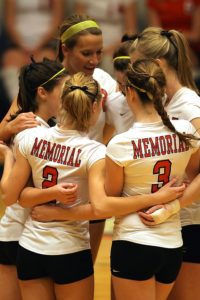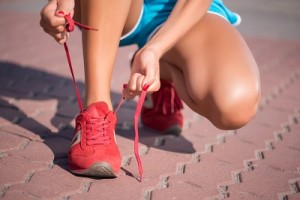- Calls to this hotline are currently being directed to Within Health or Eating Disorder Solutions
- Representatives are standing by 24/7 to help answer your questions
- All calls are confidential and HIPAA compliant
- There is no obligation or cost to call
- Eating Disorder Hope does not receive any commissions or fees dependent upon which provider you select
- Additional treatment providers are located on our directory or samhsa.gov
Binge Eating Disorder Among College Athletes

Eating disorders in college athletes are on the rise. Studies have shown that 25% of female college athletes and 20% of male athletes have a diagnosed eating disorder [1]. Proper nutrition is essential for an athlete at the college level.
When a body is not properly nourished, the body functioning is at risk for injury and health issues due to the sports exercise requirements.
Often eating disorders start with disordered eating patterns [1]. One potential reason is the aesthetic look of the sport.
Many uniforms are form fitting or are of little coverage. Another reason is the rigorous demands of performance in the sport such as speed or agility.
Coaches, teammates, and the athlete themselves may have unrealistic expectations for their performance or potential within the sport. Lastly, societies view of what an athlete should look like that are promoted by various sports brands are readily visible to many young athletes.
What Pushes an Athlete to Binge Eat
Binge eating in athletes often occurs due to rigid eating patterns, fasting practices, and numerous sport and academic stressors [2]. Binge eating can be described as engaging in binge eating episodes more than one time per week for more than three months.
During the eating episodes more than normal, according to a person’s culture, is ingested in a two hour time period or less. Often feelings of being unable to stop the binge eating, coupled with feelings of guilt and shame are common.
Binge eating episodes are typically done in secret and compensating behaviors to rid the body of the food intake are not engaged. With binge eating and non-compensating behaviors weight gain and possible obesity are common. Many athletes will engage in periods of rigorous restriction and fasting in between binge eating episodes.
Effects of Body and Brain from Binge Eating
Athletes have a higher incidence of eating disorders than non-athletes [2]. Statistics of BED in athletes reports that almost 2% higher among athletes than the general population. In a large scale study of 1,400 NCAA D1 athletes, 10% of females and 13% reported binge eating at least 1 time per week [2].

Binge eating activates the reward and pleasure region of the brain, which is similar to that of an individual addicted to substances. Binge eating typically involves ingesting foods with high carbohydrate, fats, and sugars which directly affects dopamine and other neurotransmitters that work to reinforce the pleasure area of the brain.
When there is a period of calorie restriction or fasting in athletes, there is a depletion of energy. The energy depletion signals the hypothalamus to alter hormone regulation. Hormones affected are a decrease in leptin production, insulin, testosterone, and thyroid.
Hormone dysregulation also increases ghrelin and insulin which affect hunger cues and urges to binge [2]. When athletes do finally eat after restriction or fasting, the brain intensifies the taste receptor signals in the brain as well, which further increases pleasure and urges to binge eat.
When binge eating has been studied in clinical trials, those with withdrawal effects from binge eating, experience mood shifts, irritability, and urges to eat more. This can motivate the athlete to consume more to end the withdrawal sensations and continue the cycle of binge eating.
Common Treatments
If you are concerned for yourself or a teammate, go to your college counseling center. Clinicians are available to talk with you about your issue and provide counseling or refer you a treatment facility for care.
Often binge eating can be treated on an outpatient basis unless your condition is severe. Therapy consists of a combination of individual therapy, group therapy, and peer support groups.
Counseling uses cognitive behavioral therapy (CBT), dialectical behavioral therapy (DBT), body image improvement work, as well as increase self-esteem and self-worth. Nutritional therapy is also included in treatment to help the athlete get on a proper eating meal plan to be able to best fuel the body for daily functioning and their sport.
Some programs include continued modified exercise for the athlete to be able to address faulty thinking around exercise and their sport. Medications can also be used to address underlying mental health issues such as depression, anxiety, and other concerns.
Within the therapy setting, other pressures such as academics, relationships, and personal expectations can be worked on and addressed. Therapy is an extremely useful tool in being able to learn how to manage binge eating disorder.
Many individuals who struggle with binge eating disorder, also have underlying issues of depression, anxiety, and mood disorders. Low self-esteem and a decreased quality of life have also been reported.
These symptoms are also true of athletes who struggle with binge eating. These underlying issues can also affect performance, fitness levels, personal relationships, academics, and productivity.

Libby currently works as a counselor at Fontbonne University and is a Adjunct Professor at Saint Louis University, and is a contributing author for Addiction Hope and Eating Disorder Hope. Libby lives in the St. Louis area with her husband and two daughters. She enjoys spending time with her family, running, and watching movies.
References:
[1] N. (2014, March 04). Disordered Eating in Student-Athletes: Understanding the Basics and What We Can Do About It. Retrieved June 20, 2017, from http://www.ncaa.org/health-and-safety/nutrition-and-performance/disordered-eating-student-athletes-understanding-basics[2] Academy, U. S. (2016, January 15). Binge Eating and Binge Eating Disorder in Athletes: A Review of Theory and Evidence. Retrieved June 20, 2017, from http://thesportjournal.org/article/binge-eating-and-binge-eating-disorder-in-athletes-a-review-of-theory-and-evidence/
The opinions and views of our guest contributors are shared to provide a broad perspective of eating disorders. These are not necessarily the views of Eating Disorder Hope, but an effort to offer discussion of various issues by different concerned individuals.
We at Eating Disorder Hope understand that eating disorders result from a combination of environmental and genetic factors. If you or a loved one are suffering from an eating disorder, please know that there is hope for you, and seek immediate professional help.
Published on September 8, 2017.
Reviewed By: Jacquelyn Ekern, MS, LPC on September 8, 2017.
Published on EatingDisorderHope.com

